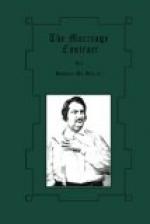How could Paul, who loved as men love when desire increases love, perceive in a girl of this nature whose beauty dazzled him, the woman, such as she would probably be at thirty, when observers themselves have been misled by these appearances? Besides, if happiness might prove difficult to find in a marriage with such a girl, it was not impossible. Through these embryo defects shone several fine qualities. There is no good quality which, if properly developed by the hand of an able master, will not stifle defects, especially in a young girl who loves him. But to render ductile so intractable a woman, the iron wrist, about which de Marsay had preached to Paul, was needful. The Parisian dandy was right. Fear, inspired by love is an infallible instrument by which to manage the minds of women. Whoso loves, fears; whoso fears is nearer to affection than to hatred.
Had Paul the coolness, firmness, and judgment required for this struggle, which an able husband ought not to let the wife suspect? Did Natalie love Paul? Like most young girls, Natalie mistook for love the first emotions of instinct and the pleasure she felt in Paul’s external appearance; but she knew nothing of the things of marriage nor the demands of a home. To her, the Comte de Manerville, a rising diplomatist, to whom the courts of Europe were known, and one of the most elegant young men in Paris, could not seem, what perhaps he was, an ordinary man, without moral force, timid, though brave in some ways, energetic perhaps in adversity, but helpless against the vexations and annoyances that hinder happiness. Would she, in after years, have sufficient tact and insight to distinguish Paul’s noble qualities in the midst of his minor defects? Would she not magnify the latter and forget the former, after the manner of young wives who know nothing of life? There comes a time when wives will pardon defects in the husband who spares her annoyances, considering annoyances in the same category as misfortunes. What conciliating power, what wise experience would uphold and enlighten the home of this young pair? Paul and his wife would doubtless think they loved when they had really not advanced beyond the endearments and compliments of the honeymoon. Would Paul in that early period yield to the tyranny of his wife, instead of establishing his empire? Could Paul say, “No?” All was peril to a man so weak where even a strong man ran some risks.




